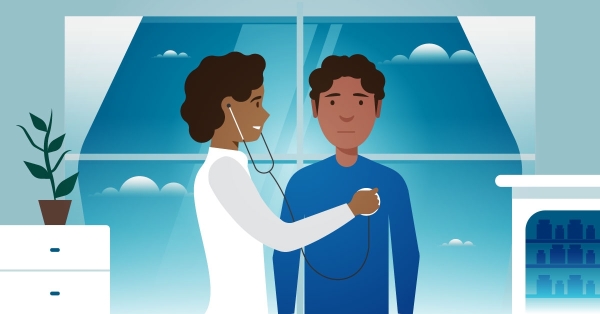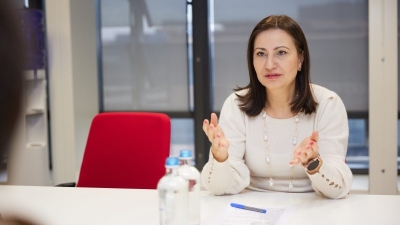Mental Health Week shines a light on ‘communities’

These are the fundamental goals of the current European Mental Health Week, which runs from 22 to 28 May and is led by the NGO Mental Health Europe (MHE) for the fourth year in a row.
Mental Health Week supports various themes throughout the week, including mental health for all, diversity in health, access to care, prevention and control of chronic diseases, and global health emergencies and response, with each day having specific partners such as the European Observatory on Health Systems and Policies, the Association of European Cancer Leagues, and the World Federation of Public Health Associations.
Mental Health Week is also supported by the WHO Regional Office for Europe and the European Commission’s health department, DG SANTE.
The year’s theme – “mentally healthy communities” — shines the spotlight on the process of understanding and learning about mental health.
A Commission source told this website: “We need to look at mental health as an aspect of every human experience, influenced by many factors”.
By making information available “early, within families, networks, schools, and workplaces”, and by integrating conversations about mental health into the many public-facing fora, policymakers can hope to foster what MHE refers to as “mentally healthy communities”, allowing all of us to “thrive without fear of stigma or discrimination,” added the source.
AdvertisementThe focus from MHE on ‘community’ may seem, at first sight, to be a perfunctory nod in the direction of current trends and buzzwords – yet this couldn’t be further from the truth. The science shows that community activities and engagement can provide a sense of belonging, support, and purpose and can directly address issues of self-worth, loneliness, and anxiety by nurturing a more expansive support network for members of the community. These activities can include anything from hobby groups, dance groups, societies, volunteering and sports clubs, to purpose-made support groups for alcoholism, drugs, loneliness or bereavement.
In fact, a large Australian study revealed that psychological distress reduced by 34% from playing recreational sport 1-3 times a week, and by 46% when played 4 times a week. Relaxed social environments are also strongly associated with the elimination of stress hormones. Exercise causes the release of endorphins which counteract stress hormones cortisol and adrenaline, and the effect has been found to be higher in group sports. Outdoor sport also involves being outside and in the sun, which is itself strongly associated with calm and focus via the release of the neurotransmitter known as serotonin.
At the heart of the Mental Health Week’s “Culture for Health” report is the finding that participatory arts projects enabled community well-being, fostered leadership skills and encouraged people to take up new roles and responsibilities in their communities.
Community support can help people practice Cognitive Behavioural Therapy (CBT). CBT is a treatment-focused technique for anxiety and depression which encourages people to recognise their negative or inaccurate thinking and behaviour patterns. While there are ways to practice CBT and other mindfulness techniques with a practitioner, or alone with the aid of chewing sugar-free gum which helps reducing levels for the stress hormone, or with a stress ball, there are additional social advantages of community support which are harder to replicate.
As part of the Week’s programming, the parties are collaborating to host a 1.5-hour online event, which will highlight the unique forms of support that communities offer to promote mental health and well-being for people of all ages. The event will feature a panel of experts who will discuss various ways communities provide mental health support, including informal social support, counselling, arts activities, and community-wide anti-stigma campaigns. The event also is aiming to emphasise the importance of designing community spaces to support mental health and well-being. These might include playgrounds and recreation areas, but also more mundane features of our urban environment.
Furthermore, the event will address the need for a comprehensive understanding of the social, cultural, and relational factors that impact mental health. As stated in MHE’s policy recommendations, “while it might be easier to act on individual skills, this is not enough to achieve good mental health for all”. MHE argue that structural changes must be put in place to enhance protective factors and mitigate risk factors related to the broader socio-economic and environmental determinants of mental health. By acknowledging and addressing these factors, a “community-based network of formal and informal support” can be established, ensuring that mental health services and resources are accessible, inclusive, and effectively cater to the diverse needs of individuals across Europe.
Additionally, the role of digital communities in providing support is to be recognised equally to any other community, allowing online gatherings and online communities the representation and access, in the hope that online communities can be leveraged to ease the mental health crisis. These communities might include gaming groups, online fan clubs, blogs, or the online followings of content creators. While the gathering together of people may be virtual, the impacts on mental health is very much real.
Spanish Socialist MEP Estrella Dura, who sits on the employment and social affairs committee in the European Parliament, says that “resilience cannot be considered only as a characteristic of individual; it must be considered as a characteristic of society.” This sentiment, and the political centre of gravity for the event, certainly lean towards more state intervention across many policy areas in the name of mental health. For instance,an employment seminar with the European Youth Forum this Friday (26 May) will argue that unpaid internships should be banned, partly due to the perceived mental health cost.
It will remain important that stakeholders from outside the network of mental health NGO’s are included in these important conversations going forwards, or else events like Mental Health Week may struggle to gain support from business, charity and other powerful catalysts for positive change.
ends
Share this article:



